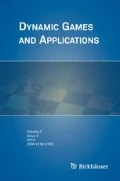Abstract
This paper introduces the notion of a potential differential game (PDG), which roughly put is a noncooperative differential game to which we can associate an optimal control problem (OCP) whose solutions are Nash equilibria for the original game. If this is the case, there are two immediate consequences. Firstly, finding Nash equilibria for the game is greatly simplified, because it is a lot easier to deal with an OCP than with the original game itself. Secondly, the Nash equilibria obtained from the associated OCP are automatically “pure” (or deterministic) rather than “mixed” (or randomized). We restrict ourselves to open-loop differential games. We propose two different approaches to identify a PDG and to construct a corresponding OCP. As an application, we consider a PDG with a certain turnpike property that is obtained from results for the associated OCP. We illustrate our results with a variety of examples.
Similar content being viewed by others
References
Amir R, Nannerup N (2006) Information structure and the tragedy of the commons in resource extraction. J Bioecon 8:147–165
Charalambous CD (2016) Decentralized optimality conditions of stochastic differential decision problems via Girsanov’s measure transformation. Math Control Signals Syst 28:19. doi:10.1007/s00498-016-0168-3
Clarke F (2013) Functional analysis, calculus of variations and optimal control. Springer, Berlin
Dockner E, Feischtinger G, Jørgensen S (1985) Tractable classes of nonzero-sum open-loop Nash differential games: theory and examples. J Optim Theory Appl 45:179–197
Dockner EJ, Jørgensen S, Long NV, Sorger G (2000) Differential games in economics and management science. Cambridge University Press, Cambridge
Dragone D, Lambertini L, Leitmann G, Palestini A (2009) Hamiltonian potential functions for differential games. IFAC Proc 42:1–8
Dragone D, Lambertini L, Palestini A (2012) Static and dynamic best-response potential functions for the non-linear Cournot game. Optimization 61:1283–1293
Dragone D, Lambertini L, Leitmann G, Palestini A (2015) Hamiltonian potential functions for differential games. Automatica 62:134–138
Fonseca-Morales A, Hernández-Lerma O. A note on differential games with Pareto-optimal Nash equilibria: deterministic and stochastic models. J Dyn Games (to appear)
Friedman A (2013) Differential games. Dover Publications, Inc., Mineola, New York
González-Sánchez D, Hernández-Lerma O (2013) Discrete-time stochastic control and dynamic potential games: the Euler-equation approach. Springer, Berlin
González-Sánchez D, Hernández-Lerma O (2013) An inverse optimal problem in discrete-time stochastic control. J Differ Equ Appl 19:39–53
González-Sánchez D, Hernández-Lerma O (2014) Dynamic potential games: the discrete-time stochastic case. Dyn Games Appl 4:309–328
González-Sánchez D, Hernández-Lerma O (2016) A survey of static and dynamic potential games. Sci China Math 59:2075–2102
Gopalakrishnan R, Marden JR, Wierman A (2014) Potential games are necessary to ensure pure Nash equilibria in cost sharing games. Math Oper Res 39:1252–1296
Jørgensen S, Zaccour G (2012) Differential games in marketing, vol 15. Springer, Berlin
La QD, Chew YH, Soong BH (2016) Potential game theory: applications in radio resource allocation. Springer, Berlin
Long NV (2011) Dynamic games in the economics of natural resources: a survey. Dyn Games Appl 1:115–148
Mangasarian OL (1969) Nonlinear programming. McGraw-Hill, New York
Monderer D, Shapley LS (1996) Potential games. Game Econ Behav 14:124–143
Mou L, Yong J (2007) A variational formula for stochastic controls and some applications. Pure Appl Math Q 3:539–567
Potters JAM, Raghavan TES, Tijs SH (2009) Pure equilibrium strategies for stochastic games via potential functions. In: Advances in dynamic games and their applications. Birkhauser, Boston, pp 433–444
Rosenthal RW (1973) A class of games possessing pure-strategy Nash equilibria. Int J Game Theory 2:65–67
Slade EM (1994) What does an oligopoly maximize? J Ind Econ 42:45–61
Sundaram RK (1996) A first course in optimization theory. Cambridge University Press, Cambridge
Tauchnitz N (2015) The Pontryagin maximum principle for nonlinear optimal control problems with infinite horizon. J Optim Theory Appl 167:27–48
Trélat E, Zuazua E (2015) The turnpike property in finite-dimensional nonlinear optimal control. J Differ Equ 258:81–114
Yong J, Zhou XY (1999) Stochastic controls: Hamiltonian systems and HJB equations, vol 43. Springer, Berlin
Zazo S, Zazo J, Sánchez-Fernández M (2014) A control theoretic approach to solve a constrained uplink power dynamic game. In: 22nd European Signal processing conference on IEEE (EUSIPCO), pp 401–405
Zazo S, Valcarcel S, Sánchez-Fernández M, Zazo J (2015) A new framework for solving dynamic scheduling games. In: IEEE international conference on acoustics, speech and signal processing (ICASSP), pp 2071–2075
Acknowledgements
Funding was provided by CONACyT (Grant No. 221291).
Author information
Authors and Affiliations
Corresponding author
Rights and permissions
About this article
Cite this article
Fonseca-Morales, A., Hernández-Lerma, O. Potential Differential Games. Dyn Games Appl 8, 254–279 (2018). https://doi.org/10.1007/s13235-017-0218-6
Published:
Issue Date:
DOI: https://doi.org/10.1007/s13235-017-0218-6




